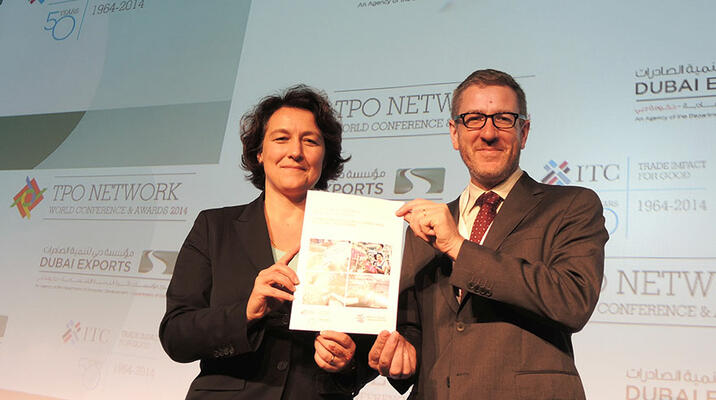
World’s poorest countries compete in value chains (en)
To be part of value chains dominated by large global players, small and medium-sized enterprises need a sound business environment, access to finance, and support from specialized trade institutions, says a joint study launched today in Dubai at the World Conference of Trade Promotion Organizations.
SME Competitiveness and Aid for Trade: Connecting Developing Country SMEs to Global Value Chains, published by the International Trade Centre and the World Trade Organization, explores trade constraints faced by businesses in 23 least developed countries (LDCs).
Some 95% of enterprises around the world are SMEs, accounting for 60-70% of private sector employment. “But failure rates are high among exporting SMEs,” said Michael Roberts, WTO’s Aid for Trade Coordinator and co-author of the study.
Seven of every ten exporting SMEs fail within two years. In LDCs, most enterprises export for just one year. Meanwhile, the trade exposure of SMEs is on the rise, as they import, export and supply to goods and services to value chains.
Aid for Trade: a focus on SMEs, but which one?
The financial crisis has rekindled development finance for SMEs as part of private sector development strategies. “Close to 70% of formal SMEs in developing economies are facing finance constraints,” stated Mr. Roberts. “If you add the informal sector, the number is even bigger.”
Development finance for SMEs is being complemented by e-platforms, greater corporate philanthropy and stronger engagement from South-South partners.
What role should trade and investment organizations play? “TPOs help small and medium-sized firms to internationalize,” said Marion Jansen, ITC’s chief economist and co-author of the report. ”Businesses in the world’s poorest countries need powerful TPOs to work with them to clear trade obstacles, so that they can be part of regional and global value chains.”
While research says that $1 of investment in TPOs leads to some $40 of exports, it does not specify the areas which bring the most value for money. Where should TPOs invest that dollar? Should focus it on markets that face the greatest regulatory barriers? On specific sectors or markets?
Services is one avenue to consider, as SMEs are gravitating towards the delivery of services. Companies in African, Pacific and Caribbean (ACP) countries have many SMEs in wholesale and retail trade, auxiliary transport activities, hotels and restaurants, and other services, noted Mr. Roberts. Large companies dominate manufacturing of textiles, food products and beverages, and chemical and chemical products. This offers SMEs a first step towards internationalization by supplying exporters, rather than exporting directly.
An LDC perspective
But it’s not that simple to link SMEs to value chains, said Jacqueline Mneney Maleko, Director General of TanTrade in the Republic of Tanzania. “The failure rate is very high. A “one shoe fits all” approach will not work for the informal sector, nor for the variety of micro and small businesses, nor for women facing specific cross-border trade issues, including sexual harassment.
“In our case, we now have the police, customs, migration officers working to help women in cross-border trade, and it is making a difference,” she added. “We also need help for accreditation so that these businesses can test their products, improve them, and supply the many five star hotels in our country”.
“We want to launch a massive campaign to encourage people to buy from women and youth, who have no access to “who’s who” in the market chain. We have people who are entrepreneurs out of necessity – not by design, but default. We want to help them so that it is not just moonlighting to bridge the income gap.”
Above all, there must be political will and coherent policies that offers SMEs and the informal sector access to training, market information, quality management and a conducive business environment, she added.
Evaluating options to boost SMEs in value chains
The shift towards regional and global value chains affects competitiveness assessments and policy advice. Evaluations tend to focus on institutions and programmes, rather than analyze trade impact.
“Internationalization has been by default, not design, in Aid for Trade projects too,” said Mr. Roberts. WTO’s Aid for Trade Monitoring and Evaluation is encouraging the integration of more systematic trade indicators for SMEs, so that quantitative, research-based impact assessments can contribute to directing development assistance to SMEs in ways that will make them stronger players in trade.
Better use of programmes to link SMEs to global value chains is the main challenge we face today, said José Guilherme Reis, who leads the Trade and Competitiveness programme for the World Bank’s office in Turkey.
“Global value chains are factories that cross international borders. The flows of goods, people, ideas and investments within this “factory” make trade different today. This offers developing countries an opportunity to industrialize in a different way now. The policy implications should emphasize private sector needs to reduce trade costs. This puts so issues like non-tariff measures and regional integration high on the agenda.
Do Kim Lang, Deputy Director General of Vietrade explained how Viet Nam introduced policies to enhance gains for local SMEs from Foreign Direct Investment.
Elena Achar Samra, head of export promotion for ProMexico, shared how it assesses the needs of multinationals in terms of supplies from local SMEs. ProMexico then helps SMEs to meet these requirements.
Dick de Man, Deputy Managing Director of the Centre for the Promotion of Imports from Developing Countries (CBI), emphasized the importance of involving lead firms in technical assistance to connect SMEs to regional and global value chains.
“SMEs comply or die, and that is a scary environment that companies face over and over,” said Ms Jansen.” Helping SMEs to internationalize is where TPOs excel.”



